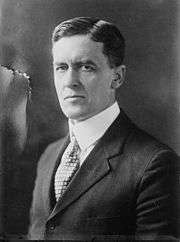Henry Pratt Fairchild
| Henry Pratt Fairchild | |
|---|---|
 | |
| Born |
August 18, 1880 Dundee, Illinois |
| Died |
October 2, 1956 (aged 76) North Hollywood, California |
| Occupation | Professor of Sociology |
| Spouse(s) | Mary Eleanor Townsend |
| Parent(s) | Arthur Babbitt Fairchild and Isabel Amanda Pratt |
Henry Pratt Fairchild (August 18, 1880 – October 2, 1956) was a distinguished American sociologist. He was a sociologist who was actively involved in many of the controversial issues of his time. He wrote about race relations, abortion and contraception, and immigration. He was involved with the founding of Planned Parenthood [1] and served as President to the American Eugenics Society.
Biography
Early life
Fairchild was born in Dundee, Illinois. His father was Arthur Babbitt Fairchild, a descendant of Thomas Fairchild who settled in New England in 1639 and his mother a member of the Pratt industrialist family.
Fairchild grew up in Crete, Nebraska, where his father was professor at Doane College. Fairchild attended Doane (AB, 1900) and Yale University (PhD, 1909). He also received an honorary LL.D. from Doane in 1930.
Education and Early Career
Teaching at Bowdoin.
Organizer and Professor
Fairchild was president of the Population Association of America from 1931-1935(?). He was president of the American Sociological Society in 1936.
He was active with Margaret Sanger in founding Planned Parenthood.
Fairchild’s major teaching appointment was at New York University. He served for 26 years, from 1919 until his retirement in 1945, and became chairman of the Department of Sociology in the Graduate School. Much of his work focused on race, nationalism, immigration, and ethnic conflict.
Fairchild was a brother of Fred Rogers Fairchild, an economist and educator, and the son and grandson of college presidents.
See also
References
External links
- Works by or about Henry Pratt Fairchild at Internet Archive
- "Henry P. Fairchild" biography at the American Sociological Society Website.
- Henry Pratt Fairchild. Immigration: World Movement and its American Significance. New York: Macmillan, c1913.